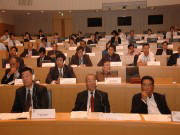Innovative Trade Unions for Professionals & Managers in Asia Pacific

|
One hundred and forty participants gathered at the two days forum which was held in the NTT R&D Center in Musashino on the 22-23 April 2009 in Tokyo Japan. There were 48 overseas participants representing nine countries present at the forum organized by UNI global union asia & pacific in collaboration with [NWJ] NTT Workers Japan. Two days forum deliberated on the theme “Innovative Trade Unions for Professional & Managerial Staff in Asia & Pacific” and the participants discussed pressing issues affecting their members in developed and developing countries in the region. Shrinkage of links between human beings in families, societies and work places are matter of serious concern for many industrially developed countries like Japan, said Prof. Takeshi Shinoda, from Ritsumeikan University. Lack of choices for people in an affluent society is also reflection of some form of poverty, limited choices and absence of proper work life balance is linked with declining birth rates in the developed countries revealed by the professor at the forum. Atusushi Fukayama from NWJ revealed that IT industry in Japan has become less attractive to the young professionals as they have to put up long hours of work. Young researchers who join the work place they are conscious about unions. However, they would like to keep a balance between professional work and union work. Therefore, unions need to have a bigger pool of union activist to take up leadership and also work on voluntary basis. The Korean situation was also similar; KITU President, Park Heungsik said, that long working hours and lower pay is common amongst many IT employees as the industry. Korean business conglomerates sub-contract work to small entrepreneurs where there are no trade unions and employees are poorly paid. In Korea, IT industry operates in three tiers where big conglomerates have an upper hand. Average life span of an IT employee in Korea is around 10 years. Securing decent work for IT employees should be trade union priority; Korea is in the lowest web of the OECD decent work index. KCTU in Korea is pressing the government to introduce Job Security Tax to create a fund to assist IT employees. Karthik Shekar General Secretary of introduced UNITES Professionals as the only union that represent IT employees in India. UNITES is a young union, how ever they have earned a reputation amongst the IT employees in India and he said that his union cautioned authorities about the Satyam scam. Shekar insisted that UNI passport scheme need to be popularized amongst Indian IT professionals who are working abroad. He also thanked Joho-Roren for helping and Satyam employee who faced difficulties in Japan Union Social Responsibility is the JSD’s commitment to monitor CSR and strengthening good governance as envisaged in the GFA in Takashimaya Corporation said Manabu Kawahashi speaking on ethical, social and professional responsibilities. Michael Lim President of Singapore Bank Employee’s union highlighted the innovative approaches to recruit organize service and retain professionals in trade unions in Singapore. Yoichi Chigami from UI ZENSEN Japan explained the various measures introduced by the federation to reduce long working hours of supervisory and managerial staff in retail industry in Japan. Name only managers who are been compensated with a fixed allowance for added responsibilities assigned does not strictly fall in to the legal definitions applicable to managerial staff in Japan. UI ZENSEN has come out with its own criteria to define P&MS, and their working patterns, and working time. Labor and management re in regular consultations to identify those who are do not fall under the real definition of managerial staff and assign job positions with out loss of benefits in the companies. Based on forum conclusions priorities and a work plan were agreed. Accordingly, UNI Apro to come out with a set of guidelines for affiliates to recruit organize, service and retain Professional and Managerial Staff in Trade Unions in the Asia & Pacific region. Forum conclusions and priorities to formulate Guidelines on: Ethical and social responsibility Promote and distribute the UNI P&MS Code for individuals to use as a guide at workplace Profile trade unions as clearing house or contact point for ethical issues at work Make ethics subject of Global Framework Agreements [GFA] and collective agreements Provide space for Professionals to practice ethics and standards link with CSR Innovation Promote and practice Web2.0 to improve information and communication processes with Professionals and Managerial Staff: Use blogs to organise debate on ethics, innovation and WLB and invite P&MS to join Revive UNI passport scheme, assist Migrant P&MS with trade union protection globally Implement 3D internship – Extend solidarity with young professionals and encourage their participation in trade union work Explore partnerships with Professional associations; engage in practical cooperation with employers,promote harmonious industrial relations at workplace to make trade unions relevant for P&MS Develop strategies to assist P&MS to maintain their employability and life-long learning Work-Life-Balance [WLB] Create awareness on Work-Life-Balance through brochures, and leaflets Introduce UNI guidelines for WLB, Checklist: WLB in your company Compile good practice examples and disseminate success stories amongst affiliates Encourage trade unions to negotiate to secure work life balance through collective bargaining UNI asia & Pacific Regional Secretary, Christopher Ng acknowledged the presence of both, Telecom Indonesia Management and trade union representatives at the forum. Partnerships and collaborations between management and unions he said; will encourage P&MS positively to join trade unions. Harmonious industrial relations in companies contribute for sustainable businesses and facilitate the P&MS to take interest in trade unions. |















